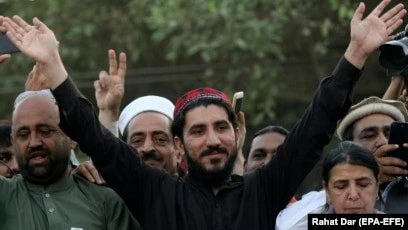Mohsin Dawar’s Double Game

In an increasingly polarized political landscape, voices that claim to speak for marginalized communities must be scrutinized not only for their intentions but also for their affiliations. One such voice is Mohsin Dawar’s , a self-proclaimed representative of the Pashtun community, who has once again stirred controversy with an inflammatory interview shared on NDM’s official X account. Rather than advocating for justice, reconciliation, or national unity, Dawar’s rhetoric played into a well-worn foreign script, one that echoes remarkably with India’s strategic narrative against Pakistan.
Dawar’s interview painted a grim picture of Pakistan, characterizing the state as an oppressor of Pashtuns. But this is not merely a critique; it is a deliberate distortion. While his words may be cloaked in the language of rights and resistance, the core of his message is far more insidious. It is a calculated attempt to vilify Pakistan’s institutions and sow discord within its diverse population, especially among the Pashtuns, who have historically been some of the country’s most loyal and patriotic citizens.
Let’s not forget, Pashtuns have borne the brunt of Pakistan’s war against terrorism. They have lost homes, livelihoods, and loved ones in the battle to rid the region of extremist elements. And yet, rather than acknowledging this collective sacrifice, Dawar accuses the very state that has fought to protect his people of orchestrating their oppression. This inversion of reality doesn’t just insult the intelligence of his audience; it betrays the countless Pashtun families who have stood shoulder to shoulder with the military in defense of the nation.
The irony is staggering. While our soldiers continue to lay down their lives to ensure peace in the tribal areas and Khyber Pakhtunkhwa, Dawar is busy accusing the state of deception. He calls the war on terror a charade. Tell that to the mothers who have buried their sons wrapped in the green flag. Tell that to the children who will grow up without fathers. Dawar’s words do not represent the aspirations of the Pashtun people; they mock their pain.
His affiliations further darken the picture. Dawar’s clandestine meetings with fugitive Ashraf Ghani, the disgraced former Afghan president, speak volumes. These are not diplomatic encounters; they are conspiratorial alliances. When he meets figures like Ghani behind closed doors, it is not to discuss peace or progress. It is to plot narratives, align objectives, and coordinate strategies, strategies designed not to uplift the Pashtuns but to destabilize Pakistan. The question then naturally arises: Who is Mohsin Dawar really working for?
The answer, though unspoken, resonates loudly across Pakistan’s political and security spectrum. Each time Dawar blames Pakistan for the Taliban’s resurgence, he ignores the undeniable truth, that it was Pakistan’s forces who fought on the frontlines, sacrificing thousands to eliminate these elements. It is India that has continually tried to paint Pakistan as a terror sponsor on international platforms. And now Dawar’s accusations, dressed in local grievances, serve as ammunition for that very campaign.
It begs another question: How much is Mohsin Dawar being paid to sell the Indian narrative in Pashtun packaging?
His statements are not spontaneous or isolated; they are part of a broader disinformation effort. He waves the Pashtun flag, but his strings are being pulled by external actors. This is not identity politics; it’s national betrayal. His agenda is not empowerment; it’s disruption. He is not building bridges for the Pashtun people; he is burning the foundations of unity that Pakistan has painstakingly constructed over decades.
Consider the progress in Khyber Pakhtunkhwa over recent years: improved infrastructure, expanded education, integration of tribal areas, and increased political representation. These are real, measurable gains, achieved through tireless effort and cooperation between the government and local communities. Yet, Dawar remains silent on these achievements. Why? Because they contradict the tale he’s trying to tell. A tale where Pakistan is the villain and the Pashtuns are the eternal victims, a tale that serves only those who wish to weaken the country from within.
Dawar does not want justice; he wants chaos. And chaos, as history has repeatedly shown, is the oldest trick in the enemy’s playbook. His strategy is to fracture the national fabric, to turn brother against brother, and to replace trust with suspicion. But Pakistan has seen such tactics before. And it has survived them, not because of politicians or narratives, but because of its people.
Real Pashtuns do not stand with divisive opportunists. They stand with Pakistan. They stand with the Constitution. They stand with the soldiers who protected their villages from militants and rebuilt their schools. Mohsin Dawar, in contrast, stands with those who would rather see Pakistan fractured than flourishing.
Meeting with fugitives is not diplomacy; it is collaboration with enemies of the state. When Dawar shakes hands with those who fled their nations in disgrace, he isn’t offering solidarity, he’s showing allegiance. And when he echoes the accusations heard in Indian media, it’s not activism, it’s strategic mimicry. The aim is clear: to destabilize Pakistan from within using the language of dissent, masked as human rights advocacy.
You do not serve Pashtuns by dividing the nation. You serve India by weakening our unity. In a time when Pakistan needs cohesion, healing, and a shared vision for the future, Mohsin Dawar is busy undermining the very principles that can lead to lasting peace and prosperity.
The Pashtun community deserves better. It deserves leadership that uplifts, not agitates. It deserves voices that unify, not divide. It deserves representation rooted in truth, not treachery. The people of Pakistan, Pashtun, Punjabi, Sindhi, Baloch, and others, have a shared destiny. That unity is our strength, and we must guard it fiercely. Mohsin Dawar may shout, but his echo rings hollow. His double game is exposed. The national stage must not be a platform for foreign scripts. It’s time for Pakistan to call out this duplicity for what it is, not dissent, but betrayal.












